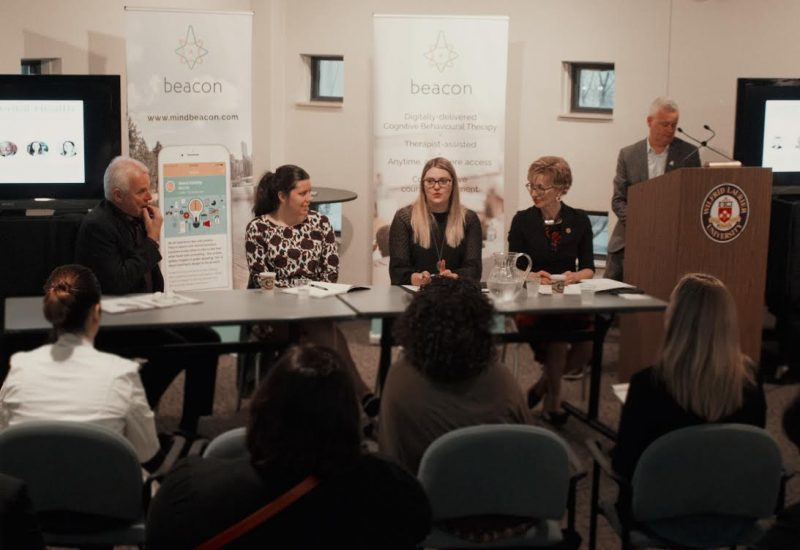Laurier talks about BEACON, a new and free online mental health service for students


On May 4, Wilfrid Laurier University hosted a panel discussion for BEACON, a recently-launched, online cognitive behavioural therapy treatment tool designed to aid students in effectively dealing with various mental health issues.
The project, which is entirely digital and accessible through a phone or computer — on an app or their website — offers a more accessible, affordable, convenient and confidential mental health solution, which promises to be equally as successful as face-to-face therapy.
Laurier is going to be used as a testing ground for this project and will therefore be made free to those who are deemed suitable for the online tool.
In a press release provided at the panel, BEACON said that “campus mental health issues and access to supports on post-secondary campuses are a growing concern” and that “demand for more on-campus mental health resources has continued to rise over the years.”
One in three post-secondary students specifically deal with mental health issues, with more than 13 per cent who have or have had suicidal thoughts.
“Two-thirds of those suffering from mental health issues in Canada are not getting the treatment they need to a number of barriers, including affordability, accessibility, and stigma,” the press release said.
The Provincial Government reflects this concern in their commitment to the project.
“The Province of Ontario has a very aggressive mental health and addiction strategy. We are committing $2.1 billion — this is a historic amount — in addressing mental health and addiction issues in Ontario,” said Daiene Vernile, member of provincial parliament for Kitchener.
Their goal in addressing mental health concerns is very clear and it is directed towards preventative and more accessible care for those in need.
“One exciting new thing that we’re going to be doing is having mental health workers right in every high school across Ontario to try to catch issues before those young people go off to university,” said Vernile.
“We want to build a kind of system where whoever needs mental health support, wherever, whenever, can find this in Ontario. We realize it is a growing need and we want to address it.”
Colin Andersen, executive vice-president of BEACON and former Ontario deputy minister, provided a better understanding behind the goals of the project.
“[BEACON offers] a digital version of cognitive behavioural therapy, which is a proven treatment for mood and anxiety disorders,” said Andersen.
He noted that the therapy is aimed at the most prevalent mental health issues people face such as depression, anxiety, panic, social anxiety and PTSD, which makes up about three quarters of cases.
“What it does is it helps people build coping skills and resiliency skills, so cognitive behavioural therapy is a mix of readings, thought journals, psychoeducational work, exercises — you learn to recognize your triggers, emotions, behaviours and thoughts, all working together — and effectively, you’re taught to be your own therapist moving forward, so you can better cope with issues,” Andersen said.
BEACON as a project, Andersen explained, is also incredibly reliable and accurate.
“We start with a very rigorous assessment process,” he said.
“It’s all grounded in clinically-validated measures … evidence-based protocols … all grounded in data … that we know are shown to be effective.”
The digitized, online therapy tool also boasts success rates in half the time with an average of eight weeks, as opposed to the 16 to 20 face-to-face sessions required by traditional cognitive behavioural therapy.
Each person is assigned a designated therapist who is able to keep track of their specific situation and help them through whatever problems they may be having.
“[There are] no restrictions on scheduling of appointments or things like that – they text back and forth, as they’re working through, the therapist is guiding them and monitoring what they’re doing,” Andersen said.
The affordability of mental health treatment, which is a growing concern for university students especially, is a direct focus of the project.
“Mental health services largely have to be paid for out of pocket, and of course a treatment — for depression for example — can cost $3-4000, whereas BEACON can do it for free for Laurier students,” Andersen said.
“[A full year of our online] treatment is about $500, or $800 if you want a psychological diagnosis as well. So that’s about one-quarter the cost.”
The BEACON project has launched for Laurier already, with hopes of expanding to other colleges and universities during the summer — like Mohawk and Seneca — with the intent to go nationwide within the month.
Students can request access to BEACON’s services through the Student Wellness Centre.


